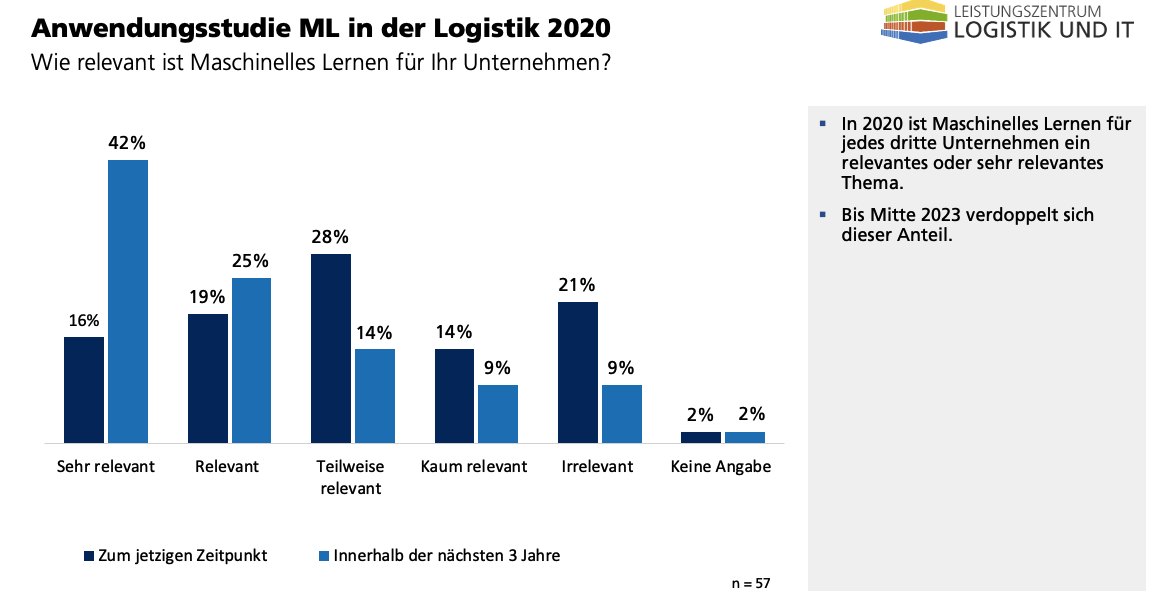The use of artificial intelligence and machine learning (ML) has been gaining increasing importance in logistics for some time now. The Center of Excellence Logistics and IT and the Fraunhofer Institute for Material Flow and Logistics therefore wanted to find out by means of an online survey what the status of the implementation of current and planned projects as well as the information requirements from the user’s point of view is in the ML area. The user study ML in logistics was designed and carried out by the Center of Excellence Logistics and IT between the end of 2019 and mid 2020. Companies were cordially invited to participate in the survey in order to gain a realistic picture of the spread and current significance of ML in logistics.
The survey period was from April 2020 to May 2020, where the participants were asked to answer a total of 12 closed questions on ML. The aim was to collect information on the current and planned use of ML for tasks in logistics by German companies. The 57 participants were 50 percent from the service sector, 42 percent from industry and eight percent from trade. More than half of the participants came from middle management. On the question of the relevance of machine learning for the respective company, the assessments were very clear. In 2020, ML is a relevant or very relevant topic for every third company. According to the results of the survey, this share will double by mid 2023.
The relatively low relevance so far is partly due to the lack of knowledge in the field of ML; only 15 percent of the participants stated that they have no need for further information. Almost half of the respondents would like to know more about application examples and how the ML works. Currently, less than ten percent of companies still use ML for logistics tasks. Almost a third of the companies, however, are already carrying out implementation projects or plan to do so in the next three years. This is especially due to the numerous applications of ML in logistics. It can be used for the selection of suppliers, determination of requirements, stock management as well as for the planning of transports, productions, sales and distribution. In the procurement, at the purchase, in the production as well as storage ML is used only with few enterprises, likewise few conversion projects take place here. Nevertheless, some companies are planning projects in the areas of production planning, internal transport, warehouse management and customer communication.
ML basically requires a certain data basis, but according to the survey only 29 percent have a very good or good availability of data. The majority of companies see opportunities to improve performance, reduce costs and develop new services, products and services through the use of ML. Counteracting the lack of specialized workers is seen as an opportunity for ML by almost 40 percent of the companies.
According to 49 percent of companies, the main obstacles to the use of machine learning are a lack of know-how and personnel resources. Companies primarily see their own resources, external service providers and research institutions as implementation partners. Projects that have been implemented or are currently being implemented are predominantly carried out with external service providers. ML projects with customers and/or suppliers are the exception. Of the 18 companies that have named personnel shortage as the main obstacle, eight companies are remarkably planning an independent introduction of ML.
In the Center of Excellence, scientific institutions synergetically build up a national infrastructure and an open innovation ecosystem – from basic research to applied research, together with industry. The research services and results are used directly within the participating institutions – whether in teaching, in doctoral theses and student research projects or in the context of contract research, including in the associated Enterprise Labs. This has resulted in a constantly updated and direct transfer stream from research to teaching and application. In the interdisciplinary research groups, the eight research clans, scientists from different institutions work on the topics “Human-Technology Interaction”, “Data”, “Processes and Systems” and “Planning, Simulation, Control”. With the research clan Machine Learning, an interdisciplinary research group in the Center of Excellence is already comprehensively dealing with the topic.
We thank the authors Carina Culotta, Dr.-Ing. Markus Witthaut and Melisa Thaqi as well as all participants of this study!
Photo: Center of Excellence Logistics and IT




